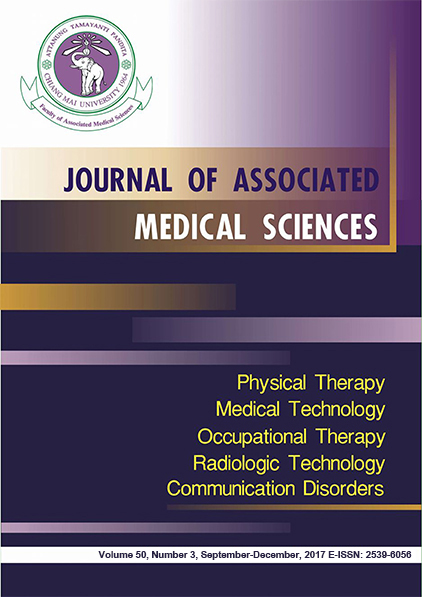Study of appropriate methods for plasma creatinine screening for renal function assessment according to the international standard
Main Article Content
Abstract
Background: Kidney disease is a major public health problem in Thailand. Kidney Association of Thailand and the International Commission recommended estimated glomerular filtration rate (eGFR) obtained from enzymatic measurement of plasma creatinine level to assess the kidney function. However, the strategy cannot be applied to all patients due to budget limitation.
Objectives: This study was aimed to compare enzymatic and modified Jaffe’s methods in measuring plasma creatinine level. Relationship of the two techniques of evaluating the kidney function, eGFR and CKD staging based on creatinine reference levels obtained from modified Jaffe’s method and enzymatic method was also determined.
Materials and methods: Plasma creatinine levels were measured in 433 routine blood samples as grouped by gender at the clinical laboratory of Payao Hospital. Enzymatic method was compared to modified Jaffe’s methods. Eight groups of these blood samples were subsequently obtained based on plasma creatinine levels. Thereafter, creatinine levels from both methods were used to calculate eGFR following the CKD-EPI formula as well as to assess the severity of kidney disease according to CKD staging criteria.
Results: In group of plasma creatinine less than 2.00 mg/dL, creatinine levels obtained from modified Jaffe’s method were higher than those of enzymatic method. In contrast, the opposite results were found in blood samples having plasma creatinine of more than 2.00 mg/dL. Values of eGFR was not different in blood samples having plasma creatinine less than 2.00 mg/dL and more than 5.00 mg/dL. However, eGFR values were significantly different in blood samples of both genders having plasma creatinine levels between 2.00-5.00 mg/dL. The relationships of eGFR from both methods in all ranges of plasma creatinine levels were good (Pearson r-value =0.972 and 0.993). Finally, CKD staging of kidney disease based on plasma creatinine levels as obtained by thesetwo methods was correlated extremely well (Pearson r-value =0.992 and 0.987).
Conclusion: Both modified Jaffe’s and enzymatic method can be used in blood samples having plasma creatinine levels of less than 2.00 mg/dL and more than 5.00 mg/dL. However, only enzymatic method can be used in blood samples having plasma creatinine levels between 2.00-5.00 mg/dL. This finding can be applied in the routine clinical laboratories.
Article Details
Personal views expressed by the contributors in their articles are not necessarily those of the Journal of Associated Medical Sciences, Faculty of Associated Medical Sciences, Chiang Mai University.
References
2. Ingsathit A, Thakkinstian A, Chaiprasert A, Sangthawan P, Gojaseni P, Kiattisunthorn K. Prevalence and risk factors of chronic kidney disease in the Thai adult population: Thai SEEK study. Nephrol Dial Transplant. 2010; 25: 1567-75.
3. Cockcroft DW, Gault MH. Prediction of creatinine clearance from serum creatinine. Nephron1976; 16(1): 31–41.
4. Levey AS, Bosch JP, Lewis JB, Greene T, Rogers N, Roth D. A more accurate method to estimate glomerular filtration rate from serum creatinine: a new prediction equation: A new prediction equation Modification of Diet in Renal Disease Study Group. Ann Intern Med 1999; 130: 461-70.
5. Rule AD, Larson TS, Bergstralh EJ, Slezak JM, Jacobsen SJ, Cosio FG. Using serum creatinine to estimate glomerular filtration rate: accuracy in good health and in chronic kidney disease. Ann Intern Med 2004; 141(12): 929-37.
6. Martin H. Kroll, Nell A. Roach, Brent Poe, and Ronald J. Elln. Mechanism of Interference with the Jaffe’ Reaction for Creatinine. Clin Chem1987; 33(7): 1129-32.
7. Sookchai J. Study of the effects of bilirubin on serum creatinine screening compared between kinetic Jaffe reaction and enzymatic method in sedimentation and unprecipitation sample. [Thesis Master of Science]. Bangkok, Makidol University, 2538. (in Thai).
8. Surasak K, Somkiat P, Jakrit N. Guidelines for the screening and care of renal complications in diabetic patients and hypertension. Bangkok; Printing house, Agricultural Co-operative federation of Thailand, 2555. (in Thai).
9. Thanyarat T. Kidney disease: for the public. Bangkok, Health work com, 2556. (in Thai).
10. The Ministry of Public Health and Association of Kidney Disease. Agreement from the main National Health Insurance, issued by the association: 232.2555 (2012) to standardize the measurement of blood creatinine level to evaluate renal glomerular filtration rate by the estimated values; eGFR that is suitable for Thai patients. 2012 (in Thai).
11. Levey AS, Stevens LA, Schmid CH, Zhang YL, Castro AF, Feldman HI, et al. A new equation to estimate glomerular filtration rate. Ann Intern Med 2009; 150(9): 604-12.
12. Kidney Disease Improving Global Outcome (KDIGO).Clinical Practice Guideline for the Evaluation and Management of Chronic Kidney Disease. Kidney Inter Supple 2012, available from http://www.kdigo.org/clinical_practice_guidelines/pdf/CKD/KDIGO_2012_CKD_GL.pdf 6
13. Cochran WG. Sampling Techniques (2nd Ed), New York, John Wiley and Sons, Inc. 1963.
14. Horio M, Orita Y. Comparison of Jaffe’s rate assay and enzymatic method for the measurement of creatinine clearance. Nihon Jinzo Gakkai Shi. 1996; 38(7): 296-9.
15. Liu WS, Chung YT, Yang CY, Lin CC, Tsai KH, Yang WC, et al. Serum creatinine determined by Jaffe, enzymatic method, and isotope dilution-liquid chromatography-mass spectrometry in patients under hemodialysis. J Cline Lab Anal. 2012; 26(3): 206-14.
16. Marakala V, Avinash S, Shivashankara A, Malathi M, Arun Kumar. Serum Creatinine assay: Enzymatic Vs Kinetic Jaffe’s method. J Evolution Med Dental Sci. 2012; 10: eISSN-2278-4802.
17. Siriporn P, Natchnok K, Chakkarin T, Papawadee H, Duangrudee C. Estimated glomerular filtration rate using creatinine levels determined by enzymatic and Jaffe kinetic methods. Srinagarind Med J 2015; 30(4): 339-43.


